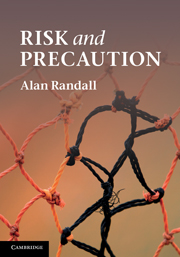Book contents
- Frontmatter
- Contents
- List of figures
- List of boxes
- Authors cited
- Acknowledgements
- List of acronyms
- Part I The precautionary principle – why so much fuss about such a simple idea?
- Part II Harm and chance – managing risk
- Part III Defining and justifying a coherent precautionary principle
- 6 A defensible precautionary principle must withstand these challenges
- 7 Toward a precautionary principle framework: evidence, threat, and remedy
- 8 Threat and evidence
- 9 Remedy
- 10 Precaution for utilitarians?
- 11 A robust and defensible precautionary principle
- Part IV Precaution in action
- Part V Conclusion
- References
- Index
6 - A defensible precautionary principle must withstand these challenges
Published online by Cambridge University Press: 05 June 2012
- Frontmatter
- Contents
- List of figures
- List of boxes
- Authors cited
- Acknowledgements
- List of acronyms
- Part I The precautionary principle – why so much fuss about such a simple idea?
- Part II Harm and chance – managing risk
- Part III Defining and justifying a coherent precautionary principle
- 6 A defensible precautionary principle must withstand these challenges
- 7 Toward a precautionary principle framework: evidence, threat, and remedy
- 8 Threat and evidence
- 9 Remedy
- 10 Precaution for utilitarians?
- 11 A robust and defensible precautionary principle
- Part IV Precaution in action
- Part V Conclusion
- References
- Index
Summary
Ordinary risk management was developed from formal analysis of games of chance (lotteries, card games, etc.) where the outcome set can be defined precisely. Possible outcomes can be enumerated and their probabilities calculated precisely. Because ORM was modeled on the “games of chance” paradigm, the ideal application of ORM is to games of chance. In Part II, we saw that ORM does a reasonably good job of handling the kinds of risk problems to which it is well-adapted, i.e. idiosyncratic risks in stationary systems where the outcome set is stable and well known.
ORM typically applies utilitarian decision criteria to simple Newtonian models of the real world. However, simple Newtonian models are often misleading, attributing more stability and predictability to the real world than is justified. The potential for high damage but unlikely events is greater than is commonly understood. We are beginning to understand that complex systems may not be stationary in the sense that stationarity is attributed to Newtonian systems (or simple games of chance), which suggests that complex systems have the capacity to generate surprises (outcomes that were not in the ex ante outcome set) and unknown unknowns. Furthermore, utilitarian decision criteria are better adapted to manageable risks – where possible outcomes can be specified, probabilities are knowable, and risks are idiosyncratic – than to surprises, unknown unknowns, and systemic risks.
- Type
- Chapter
- Information
- Risk and Precaution , pp. 83 - 101Publisher: Cambridge University PressPrint publication year: 2011



